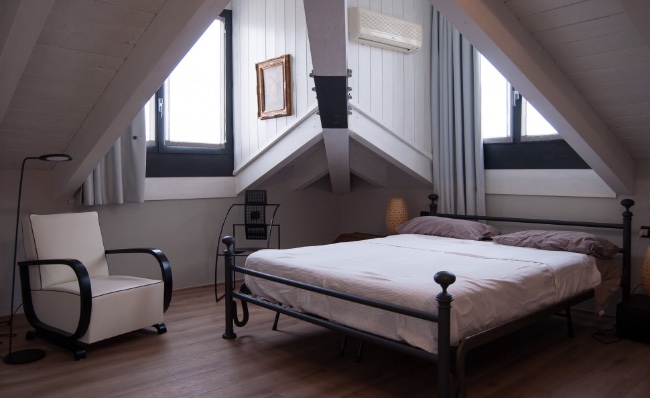
If you’ve even been on the lookout for a new place, then you know that (in the end) we all sort of turn into the picky clientele of HGTV’s House Hunters. Because as easy as that show is to make fun of (YOU CAN CHANGE THE PAINT COLOR, GUYS), it’s also pretty easy to fixate on your list of “must haves” when apartment hunting. You totally need outdoor space for a grill. Or you’ll die if you and your roommate don’t each have your own bathroom (Literally because you’ll kill them if they leave the cap off your toothpaste…again. How hard is it to buy your own toothpaste??). And, of course, it’s absolutely crucial to have an open floor plan — with the kitchen flowing into the main living space — for parties. Come on. You. Need. It.
These things are important, but what many of us spend considerably less time considering is the quality of the air in that perfect loft with views of the city. Is it by a busy street with exhaust flying in every time you open the door? Does the person with the balcony next to yours smoke outside — second-hand particles drifting in through your screen? And that second floor duplex with a faux fireplace, crown molding, and tons old Hollywood charm might be everything you’ve ever dreamed of, but if the people before you had cats, are the charming old vents pumping out a little bit of cat hair every time you turn on the heat? It’s gross to think about, but in pretty much all of our homes, pollutants, allergens, and other invisible particles are floating around without us having any idea. Well, other than wondering why we suddenly have to pop antihistamines every day just to get by in our new perfect space.
“If you think about our lungs, they’re constantly filtering air,” Dr. Thomas Ardiles, a pulmonologist and assistant professor at the University of Arizona Phoenix School of Medicine, says. “So if the quality of the air that goes in changes, and you have a disease like asthma, COPD, or even some interstitial lung disease in which your lungs are weak, then the quality of the air can make your lungs become more inflamed. Definitely, that air can make your health decline.”

Air in the home can trigger serious allergic or asthmatic reactions, so Dr. Ardiles works with patients to make their homes as trigger-free as possible. But there can be more pollutants and allergens in our homes than we realize. Allergens hide in carpets. And our mattresses can be disgusting (there are almost always large reservoirs of dust and mites). Regularly changing out mattresses and removing rugs can help, but what about beloved family pets? What if there are problem sections of your apartment or house that you’re unable to see?
“I would say the most common thing that people worry about is mold,” Dr. Ardiles says. “Mold that grows inadvertently in the house can definitely affect the breathing of patients. Mold likes humidity. So areas like bathrooms, kitchens, dishwashers, or unfound leaks from an air conditioner can cause problems with mold. It’s something to be vigilant about.”
Additionally, everyday household products can also be big culprits of pollution inside. A recent study published in Science looked at volatile organic compounds (or VOCs) in Pasadena, California. VOCs are gasses that go into the air from a variety of different solids or liquids. Many times though, these come from products and chemicals we use often in our homes. Pesticides, certain paints, cleaning sprays, aerosols, and bug repellents all give off VOCs. In this particular study, they tracked the origins of the polluted molecules from VOCs outside. Disturbingly, they found household products like soaps, shampoos, deodorants, air fresheners, and cleaning products were responsible for 38 percent of the VOC emissions outdoors. To put that in perspective, emissions from cars comprised only 33 percent. And according to the EPA, VOCs can cause eye, nose and throat irritation, nausea, headaches, and damage to the liver, kidney, and central nervous systems. Scientists suspect they could also cause cancer.
If that’s what’s getting outside, it’s also what we’re breathing inside, in an enclosed space.

There is a lot that can pollute the air inside where we live, and that can be scary. But the good news is that technology such as air purifiers with HEPA filters can have a fairly large impact. The EPA says that filtration — along with reducing the products you use that contain pollutants and ventilating with clean air — is the most effective way to improve indoor air quality. And there’s been a good amount of research to back this effectiveness up.
In one study, researchers assessed how well air purifiers capture airborne allergen particles. Over six months, they found that 70% of 0.3-μm particles and 95% of 1.0-μm particles were removed by the air purifier’s built-in filter. In another, scientists put air purifiers into dorm rooms in Shanghai. They then monitored the air quality, as well as the health of the students compared to a control group. The students with the air filtration systems had air that had a 57% reduction in small pollutant particles on average. Health also improved for these participants. Their blood pressure was better as was their lung function.
That study was of young people in good health. But for asthma sufferers, there’s evidence that a device that cleans the air can improve symptoms and outcomes too. In a study in Fresno, California, researchers put air purifiers into homes with children suffering from asthma. After 12 weeks, the group with these systems showed improvements in health scores while the control group showed deteriorating numbers.
The bottom line is that the quality of the air we breathe in our apartments and houses should be a concern for all of us. Breathing is one of those things you never think about when it’s easy but when it’s not, it’s all you can think about. And the difference between getting sick or staying in good health could be as simple as changing out the cleaning products we use or getting a better air purifier. Those are easy changes that can improve our lives and health in a big way.
So while we normally don’t spend that much time thinking about our breathing in our daily lives, thinking about it more (and about the air quality in our homes, workplaces, and schools) could prevent a lifetime of thinking about it due to difficult breathing down the line. Good air quality should at least be as important as getting the perfect flat screen (that you can see from the kitchen because of your open floor plan). And the great thing is, you can have both.






